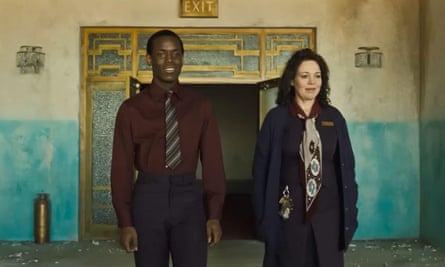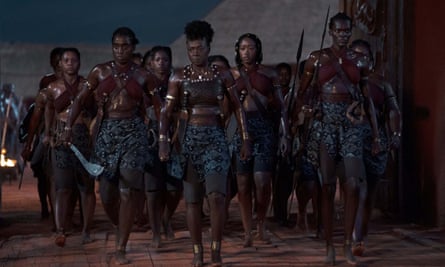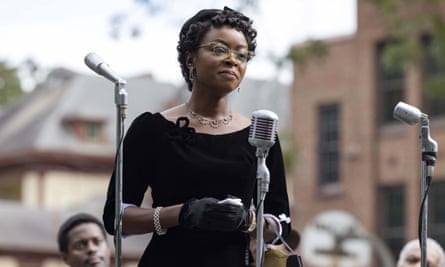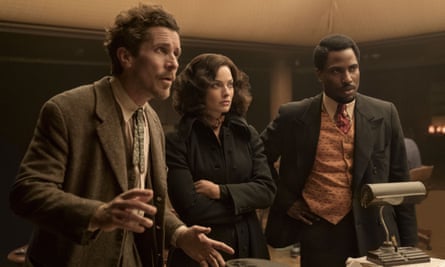There was excitement and surprise near the end of last month as the year’s Oscar nominations were announced but, following closely, there was also plenty of disappointment and anger with perceived snubs aplenty. While multiverse fantasy Everything Everywhere All at Once led the way, followed closely by The Banshees of Inisherin and All Quiet on the Western Front, a host of films that seemed, at least months ago for some, primed for awards glory were left with little or nothing.
Empire of Light

While Roger Deakins might have squeezed into the best cinematography category for his stunning work, Sam Mendes’s 80s-set drama Empire of Light was otherwise left in the dark, quite the achievement given its pedigree. The lukewarm reviews that greeted its Telluride film festival premiere quickly turned cold as more people saw it and soon scorn seeped in with the film becoming one of the season’s unfairly piled upon whipping boys, viewed as the sort of misfiring middlebrow mulch that’s made solely for trophies. It marked a steep fall for Mendes after 1917 re-inserted him into the conversation and for Colman, who the academy, and every other relevant awards body, is usually eager to reward.
Devotion

While Top Gun: Maverick exceeded even the most elevated expectations, flying into the top 10 all-time box office hits before securing six Oscar nominations, another stirring tale of flyboys also starring Glen Powell crash-landed. On paper, Devotion seemed like the more awards-friendly of the two, based on the groundbreaking true story of the navy’s first ever Black aviator during the Korean war, but mostly positive reviews (for me, it was the far superior of the two films) couldn’t lure audiences and the $90m-budgeted drama tanked with just $21m. It was a similar non-starter with academy voters, despite a strong performance from Jonathan Majors, who may well find himself in the race next year.
She Said

Hoping to replicate the success of 2016 best picture winner Spotlight with its combination of inspiring journalism, a ripped-from-the-headlines tale of enraging abuse and drab office decor, Weinstein investigation drama She Said seemed designed for academy attention. But it tanked during a busy awards season, bombing at the box office, and picking up reviews that were more polite than passionate. It seemed for a while that its star Carey Mulligan might find herself in the best supporting actress lineup after Bafta and Golden Globe nods (a clear case of category fraud but a smarter strategy by Universal given the competitive best actress race) but the film was entirely snubbed, leading some to question how long Hollywood should wait before retelling recent history.
The Woman King

Modeled as if it were an Oscar contender from decades prior (Gladiator and Braveheart were both confirmed influences), Gina Prince-Bythewood’s rousing action adventure The Woman King was an instant crowd-pleaser at both its Toronto film festival premiere and upon wide release soon after. It was the rare historical epic to centre Black women with Oscar winner Viola Davis leading the charge, the actor seen as a likely best actress contender and those doing top-tier work behind-the-scenes (on a budget lower than films of this scale usually receive) also predicted to get recognition. But, to the shock of many, it failed to get a single nomination, with Davis’s snub viewed as a direct result of the controversial last-minute Andrea Riseborough campaign.
My Policeman

Opening at Toronto with less of a roar and more of a roar with laughter was limp 50s-set drama My Policeman, the film that hoped to legitimise Harry Styles as not just a movie star (that was to be proved with Olivia Wilde’s Don’t Worry Darling, premiering days earlier at Venice) but a real actor. The overwhelming verdict was that it didn’t and he isn’t, the film receiving mostly negative reviews, instantly killing its chances as an awards contender. Instead Styles has been riding high this year with Grammy-winning album Harry’s House, leading many to predict the multi-hyphenate might remove one of those hyphens very soon.
The Son

It felt too good to be true. After the surprise success of devastating dementia drama The Father, playwright turned screenwriter-director Florian Zeller decided to adapt another one of his tough family plays, The Son, an acclaimed hit on stage (the Guardian’s Michael Billington called it “remarkable”). He assembled a stacked cast – Oscar nominee Hugh Jackman, Oscar nominee Vanessa Kirby, Oscar winner Laura Dern – and even corralled Anthony Hopkins, who won the best actor Oscar for The Father, back for a one-scene turn. But it turned out that The Son was too bad to be believed, a clunky drama that managed to get all of the things wrong that its predecessor got right, turning off critics, audiences and voters. The Mother seems unlikely to follow.
Till

There was understandable concern over a film based on the horrifying lynching of Emmett Till, one of the most impossible-to-process chapters of American history, and given a long history of black trauma exploited on screen (especially during awards season), expectations were understandably low. But Till, from Chinonye Chukwu who directed 2019’s powerful drama Clemency (star Alfre Woodard was a stinging Oscar snub that year), was a thoughtful and poignant film that avoided uneasy tropes and allowed Danielle Deadwyler the chance to shine in her first major lead role. Academy voters didn’t seem to agree with the vast majority, though, and Deadwyler was left out of the best actress category, a major shock to pundits and perhaps the result of the film still being seen as too hard-going to even consider.
Amsterdam

Last year saw a mighty fall for writer-director David O Russell, returning after a seven-year absence with a film that suggested he probably should have waited a bit longer. With period caper Amsterdam, he threw it all at the wall, including the starriest cast of the year (Christian Bale, Margot Robbie, John David Washington, Robert De Niro, Anya Taylor-Joy, Zoe Saldana, Rami Malek, Chris Rock, Mike Myers, Taylor Swift) but it sank both commercially and critically. Russell’s previous four films amassed an incredible 23 Oscar nominations and three wins but the academy, along with everyone else, steered well clear of this one.
Emancipation

Will Smith’s slavery drama Emancipation was surrounded by question marks throughout the year after the actor was embroiled in controversy related to the infamous slap we all got tired of hearing about. The recent best actor Oscar winner received a 10-year ban from the academy that would prevent him from attending any events but not from being nominated and months later, Apple announced that his collaboration with director Antoine Fuqua, telling the story of a slave fleeing a plantation, would get a late-in-the-season release. But questions of whether voters are ready to re-embrace him aside, the film was ultimately viewed as a solid thriller more than a weighty drama and it failed to receive the nominations those involved with it were hoping for.
Bardo, False Chronicle of a Handful of Truths

It was a rocky awards season for Netflix, still thirsty for that best picture win after Roma, Marriage Story and Power of the Dog all lost out, with their biggest bets mostly underwhelming. White Noise and The Good Nurse were shut out entirely while Glass Onion and Blonde had to settle for one nod each (it was dark horse All Quiet on the Western Front that ended up with the most). Perhaps the streamer’s biggest disappointment was Alejandro G Iñárritu’s homecoming comedy drama Bardo, which could only manage one nomination for cinematography. The director has previously been in the academy’s favour with a staggering 26 nominations and seven wins across his previous films but critics greeted its Venice film festival premiere with thumbs either down or wavering, labelling it a self-indulgent misstep.

 1 year ago
189
1 year ago
189










 English (US)
English (US)